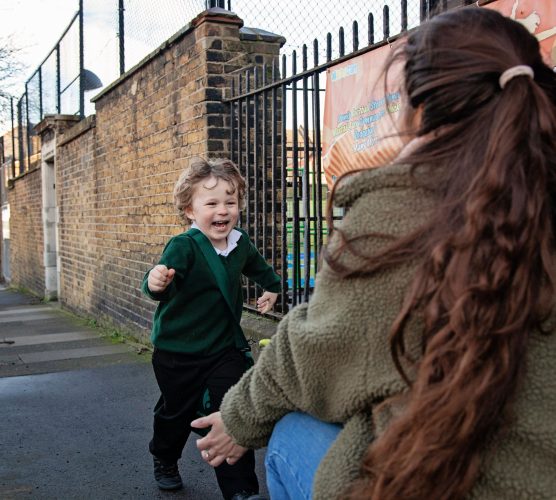We’re excited to help our kids get back into the school routine, learning and playing with their friends. While a lot of children are also itching to get back, some are finding it tough. Even some of the most confident and outgoing kids are showing signs of anxiety in the run-up to schools reopening.
We reached out to Joanna Fortune, a child psychotherapist and author of the 15 Minute Parenting series, for some tips on how to help kids return to school with ease.

1. Remind your kids you’re always there for them
They’ve spent a lot of extra time at home with you, so going back to school may be daunting and evoke some separation anxiety. Even kids who are looking forward to school may feel a little wobbly when it gets to the point of separation at the school gates, and that’s completely normal.
Some ways stay with them throughout the school day are:
4-part handshakes
Invent a special handshake between you: high-fives, fist bumps, wiggle fingers, pinkie wraps, and so on. Handshake when you say bye before school, and also when you first see them again.
Love buttons
Draw a love heart on your wrist and on theirs too. Rub them together when saying goodbye to charge them up with love. If they miss you during the day, they can touch their love button and feel your love.
Pockets full of kisses
Fill their pockets full of kisses so they can pull one out if they feel lonely during the day.
Photo keyring
Put a photo of you together onto a keyring and attach it to their school bag or put it in their pencil case. They’ll be able to look at or hold it during the day if they’re feeling a bit emotional.
Make after-school fun again

2. Role play
Role play is great for kids who are nervous about going back, to remind them of the structure of the school day. Try walking through different scenarios to let the kids practise asserting themselves and to give them some control. Try being the teacher and get them to follow your instructions to practise sequencing. For example, “Hi class, I’m your teacher. Please sit down, take your pencil case out and write your name on this paper”. Let them also have a go at being the teacher too, within the boundaries of playtime.
At the end of role play, remember to define that it’s come to an end, and you’re back to being their parent again.
3. Accept and Empathise
If your little one is feeling really anxious, go to A&E: Acceptance and Empathy. Accept that this is a big change for them which can be difficult, and empathise with their emotions.
Take it one step further from talking, to play. Sensory play is a great way to get them out of their head and into the now. Make slime, scented playdough, bake, get finger painting, play with bubbles in the bath… there’s loads. The best, though? Joanna believes in dance! The rhythm, silliness and movement from dancing triggers their busy brain, and gets their emotional regulation back on track.
Looking for more tips from Joanna?
4. Trust the teachers
Trust that teachers will get your kids back on track. The best thing parents can do for their kids is to return them to school as emotionally robust as possible, because happy kids are great learners.
The best way to get them emotionally strong and ready for cognitive learning is through play. If play is outside, that’s even better. We need to remember that learning goes beyond the curriculum, so don’t put too much pressure on catching up with academics — when they’re outdoors they’re discovering and that means learning. Try a scavenger hunt: Print or write a list of things for the kids to find outside to encourage an inquisitive mind.
5. Resist immediately asking lots of questions
It’s really tempting to jump into asking lots of questions at school pickup. After a busy day this can be overwhelming for kids, so try to find a way of connecting with them through ‘doing’ rather than ‘speaking’.
A fun game to help with this on the way home is ‘jelly ice cream’. Every time you say jelly, they reply ice cream — but they need to say it in the same way you do. If they’re hyperactive you can yell JELLY and they need to yell back ICE CREAM. Gradually bring your tone back down to a more appropriate and regulated level. If they come out of school flat, do the opposite – start off quiet and build them up.

Looking for after-school help?



